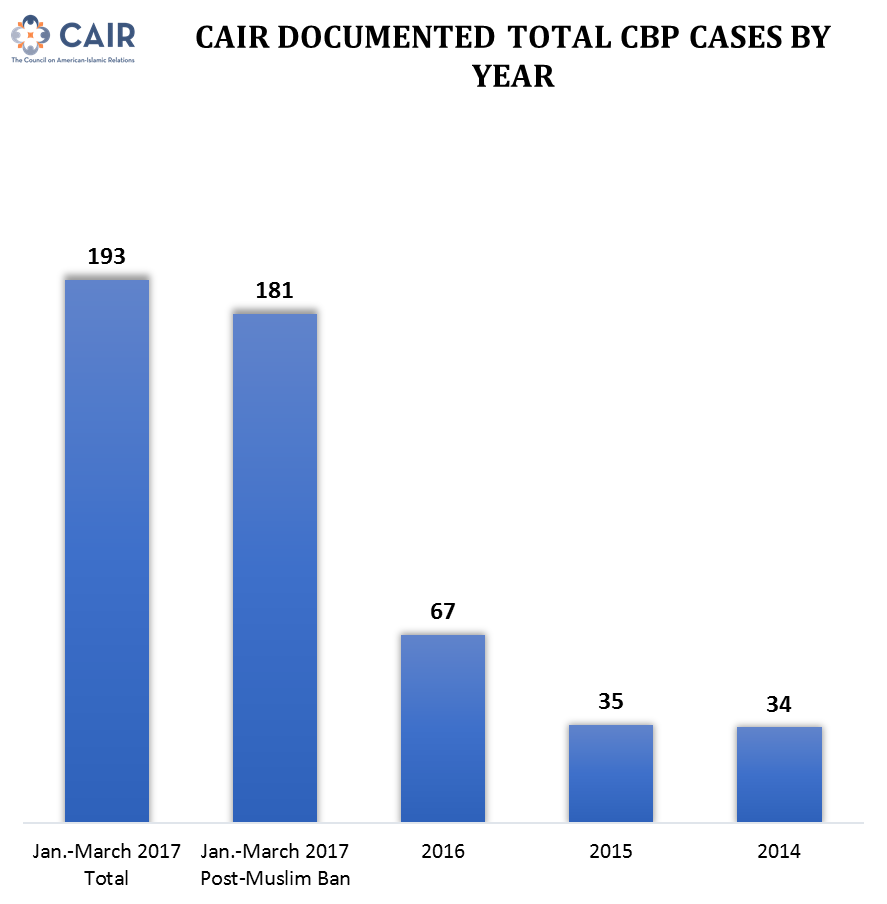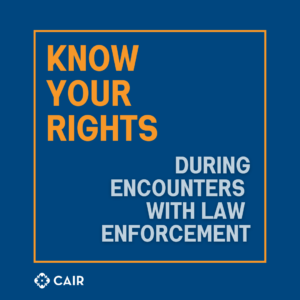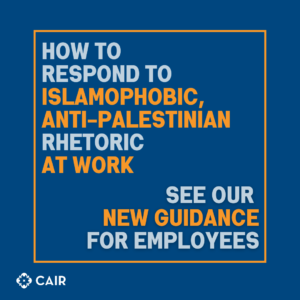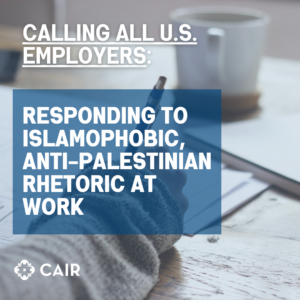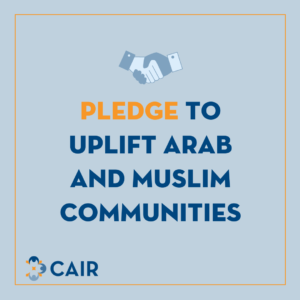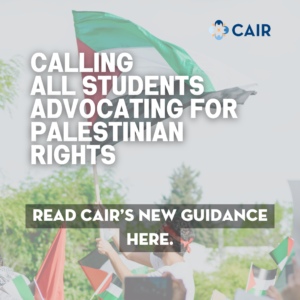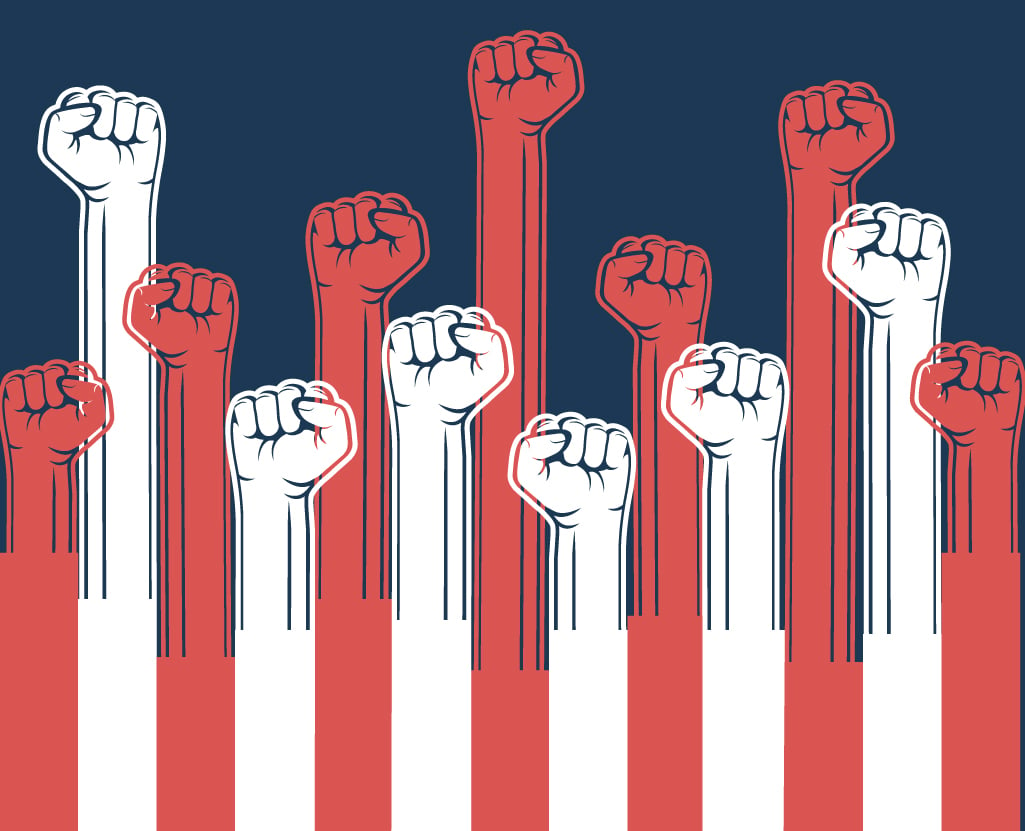“…look to the Muslim woman as an indicating factor. By the way she wears her hijab. If the hijab is a solid color it indicates religiosity. If it’s a patterned scarf, with colors, it’s more likely that she is less religious.” – Testimony of a Customs and Border Protection official in a 2013 lawsuit as reported by CAIR-National Litigation Director Lena Masri
1035 Percent Jump in Religious Profiling Cases at U.S. Ports of Entry
Preliminary data reveals that cases of U.S. Customs and Boarder Protection (CBP) profiling accounted for 23 percent of all Council on American-Islamic Relations (CAIR) case intakes in the first three months of 2017. This represents a 1035 percent increase in CBP typed cases in 2017 over the same period in 2016.
Of the 193 CBP cases recorded from January-March 2017, 181 were reported after the January 27 signing of the Executive Order “Protecting the Nation from Foreign Terrorist Entry into the United States,” also known as the Muslim Ban. These 181 post-Muslim ban cases exceeded the combined total of the 136 CBP cases that CAIR documented in the previous three years.
(Note: In early May CAIR will release a report detailing anti-Muslim bias incidents documented by the organization during the 2014-2016 period. Shortly thereafter, CAIR will release its preliminary first quarter 2017 case data.)
This significant increase in CBP related incidents has occurred in the context of the Trump administration’s early efforts to convert anti-Islam campaign rhetoric into U.S. policy. CBP incidents have not been limited to travelers from countries targeted by the Muslim ban. While the deluge of reported incidents is significant, the practice of unequal treatment of Muslims at U.S. ports of entry is not new. Recent revelations resulting from a 2013 CAIR lawsuit, which challenges invasive questioning at U.S. borders about religious practices, add further insight into faith-based profiling by federal officials.
*This data is preliminary and may evolve.
CAIR’s data mirrors findings published in a recent report by the Institute For Social Policy and Understanding (ISPU). According to ISPU’s American Muslim poll 2017, “Muslims are more than twice as likely (30%) as Jews (13%), Catholics and Protestants (11%) to be stopped at the border for additional screening.” ISPU added, “Most Muslims (67%) stopped at a U.S. border say they were easily identified as a member of their faith group, compared with 32% of Jews and none in other groups.”
Broader Context: Converting Anti-Islam Campaign Rhetoric Into U.S. Policy
The first 100 days of Donald Trump’s presidency witnessed initial efforts to translate his anti-Islam campaign rhetoric into official U.S. policy. These efforts included populating his administration with a number of officials who have a history of problematic and misleading statements about Islam and Muslims.
It also included an evolving effort to fulfill his campaign promise of a ban on Muslim entry into the U.S. There were also reports of substantive movement toward an executive order directing the Secretary of State to determine whether to designate the Muslim Brotherhood a foreign terrorist organization, a witch hunt rooted in conspiracy theories peddled by the U.S. Islamophobia network and intended to eviscerate American Muslim civil society.
CBP’s Invasive Religious Questioning Not Limited To Travelers From Muslim Ban Countries
Invasive questioning about an individual’s personal religiosity at U.S. ports of entry is one of the types of CBP encounters reported to CAIR. While not a new phenomenon, reports of the abusive practice have escalated under President Trump.
In January, CAIR chapters in Florida, California and New York filed complaints with the CBP, the U.S. Department of Homeland Security (DHS), and the U.S. Department of Justice (DOJ) over reports of systematic questioning of American Muslim citizens about their religious and political views by CBP. These complaints have been acknowledged by the agencies but no conclusions have been issued.
In one high-profile incident, Muhammad Ali Jr., son of the iconic American boxer, reported that government officials, “asked me, where was I born and what my religion was, where did I get the name from.” (Note: Mr. Ali’s case is not one CAIR filed a complaint about. He has private counsel.)
Citizens of staunch U.S. allies were also targeted. Canadian Fadwa Alaoui reported that border officials asked her, “‘Do you practice? Which mosque do you go to? What is the name of the imam? How often do you go to the mosque? What kind of discussions do you hear in the mosque? Does the imam talk to you directly?’” She was also asked about “her views on Trump.”
CAIR has documented a number of invasive questions asked of travelers including:
- Are you a devout Muslim?
- Are you Sunni or Shia?
- What school of thought do you follow?
- Which Muslim scholars do you follow?
- Which current Muslim scholars do you listen to?
- Do you pray five times a day?
- Why do you have a prayer mat and Quran in your luggage?
- Have you visited Saudi Arabia?
- What do you think of the USA?
- What are your views about jihad?
- What mosque do you attend?
- Do any individuals in your mosque have any extreme/radical views?
- Does your Imam express extremist views?
- What are the views of other Imams or other community members that give the Friday sermon at your mosque? Do they have extremist views?
- Have you ever delivered the Friday prayer? What did you discuss with your community?
- What are the names and telephone numbers of parents, relatives, and/or friends?
Revelations from 2013 Lawsuit
In 2013, CAIR filed a lawsuit against the CBP and the FBI over the repeated detention and questioning of Muslims at and inside the United States-Canada border. The lawsuit challenges both religious profiling and the un-constitutional questioning of a person’s faith and the way they choose to practice their faith.
In the case of one plaintiff CAIR is representing, CAIR-National Litigation Director Lena Masri notes, “He crossed the border into the United States [from Canada]. He was taken aside and asked religious questions. He then went back into Canada, returned to the U.S. and was asked the exact same questions by the same officers.”
Masri reports that one customs officer who was deposed in the lawsuit testified that, “All customs officials attended a training that was offered by Customs [and Border Protection]. During that training session, the officers were specifically taught to determine how to know if a Muslim is religious or cultural.”
Masri went on to explain that the officers testified that the trainers, “told [CBP officials] to [blockquote align=”left”]look to the Muslim woman as an indicating factor. By the way she wears her hijab[headscarf]. If the hijab is a solid color, it indicates religiosity. If it’s a patterned scarf, with colors, it’s more likely that she is less religious.If a scarf is opaque, it is more likely you are religious. If it is transparent it’s less likely you are religious. If you wear it tightly around your face, it is more likely you are religious. If you wear it loosely, it is more likely that you are a cultural Muslim. Based on these indicating factors, customs officials are instructed to pull you aside, detain you, and ask you religious questions.”[/blockquote]
Another customs official who was deposed admitted that, “he does pull aside people that he sees carrying a Quran or carrying religious beads.” A third customs officials acknowledged that he pulls aside Muslims who are returning from Hajj.
All the customs officials Masri deposed, at least eight, acknowledged that they do not pull aside individuals of other faith backgrounds as a consequence of their religious appearance or the religious items they carry.
(NOTE: Any case listed in this preliminary report as containing an element of religious discrimination has undergone a vetting process by CAIR intake staff that seeks to ensure the highest possible level of accuracy. Cases are updated as additional facts become available.)
Update: (4-26-2017 @ 10:45 a.m.) The article was modified to clarify that not all of the incidents documented by CAIR involved invasive questioning about an individual’s personal religiosity. This abusive practice was one type of encounter travelers reported.
Update: (4-28-2017 @ 11:15 p.m.) Added findings form ISPU’s American Muslim Poll 2017.
